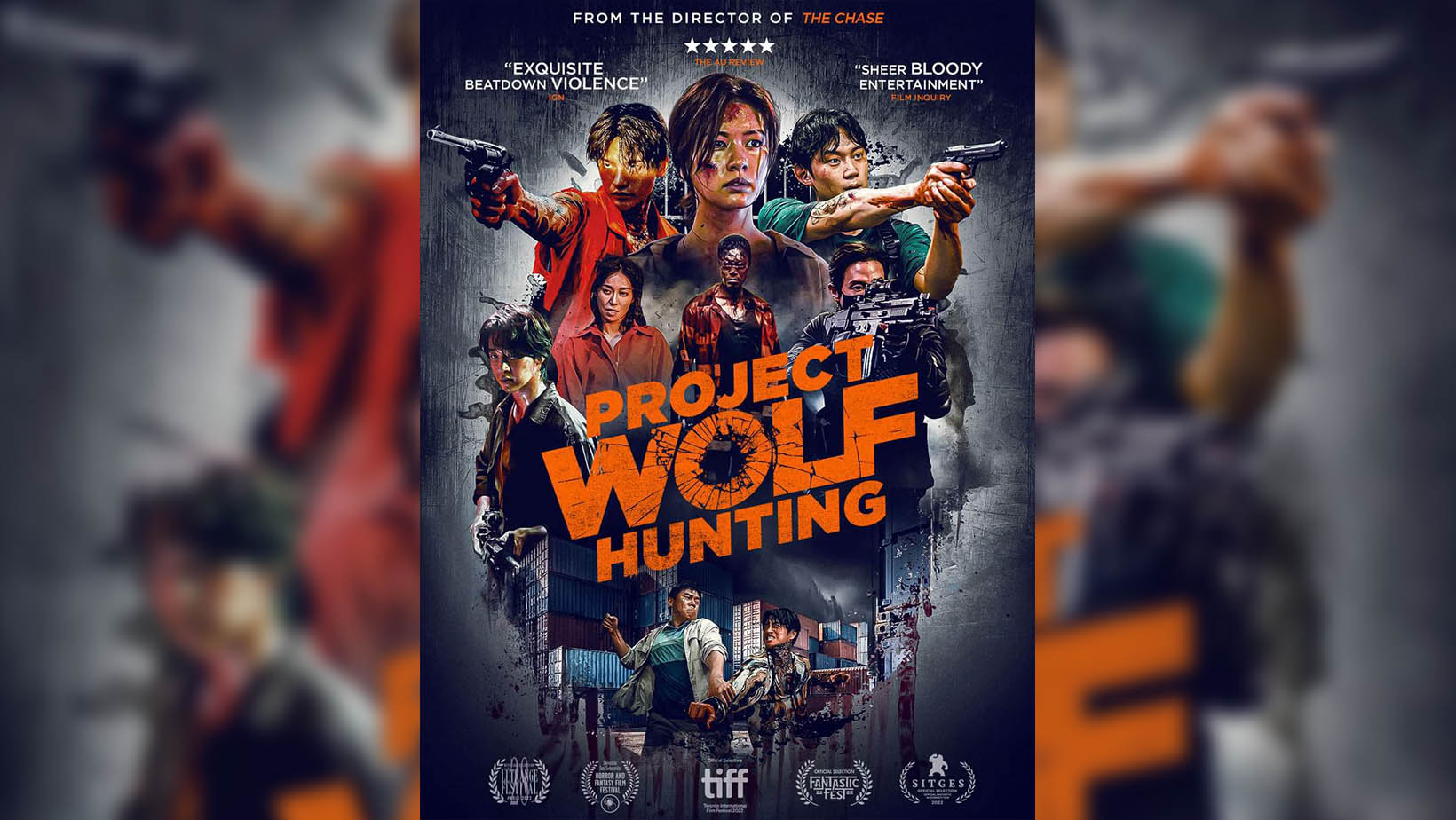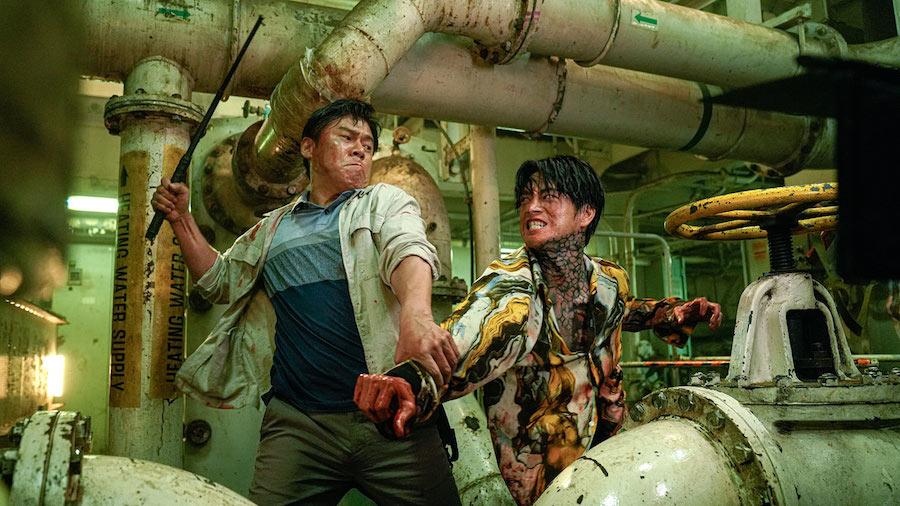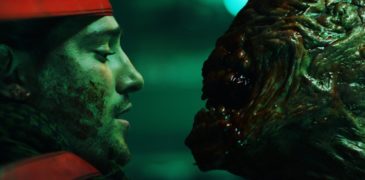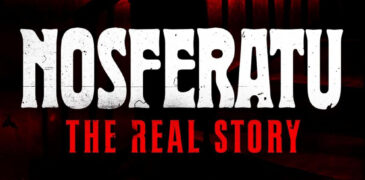
Korean genre cinema has never shied away from violence; from the unrelenting stream of beatings in I Saw The Devil to the eye-wateringly graphic tooth extraction in Oldboy, blood and brutality have long been a staple of some of the country’s best cinematic achievements. Enter Project Wolf Hunting (2022), a movie so drenched in viscera that it makes the aforementioned films look like an episode of Teletubbies. Rumours abound on Letterboxd of a fight that broke out during Project Wolf Hunting’s North American premiere at TIFF’s Midnight Madness section – and it’s not hard to see why. The latest offering from Metamorphosis director Kim Hong-sun is a testosterone-fuelled descent into carnage and chaos that could test the temperance of a saint.
Project Wolf Hunting follows the journey of 47 of Korea’s most violent and dangerous criminals during their extradition via cargo ship from the Philippines back to their home country. As expected, it’s not long before all hell breaks loose thanks to tattooed maniac Park Jang-du (Seo In-guk) breaking free of his handcuffs and orchestrating a full-blown bloodbath. But there’s more here than just a grisly Korean Con Air, as a deadly and violent secret harbored below deck turns the mutiny into a massacre.

In case the thought of getting to know the intricacies of such a giant ensemble cast feels daunting, worry not. Project Wolf Hunting neatly categorizes its characters into distinct sets of caricatures with little to no individual personalities (the women even less so). After three or four of the key players are killed off, it becomes abundantly clear that this is a cast of cannon fodder, making it hard to feel particularly invested when any of them meet their bloody ends.
There are some standouts though; Son Jong-hak (Thirst, Flower of Evil) as hapless criminal Soo-cheol provides some much-needed charm and silliness to a film that often comes across as desperate to show you how badass it is. And the monstrous Alpha, played by Choi Gwi-ha (perhaps most famous to Western audiences for his role as the heroic homeless man in Yeon Sang-ho’s Train to Busan) cuts a pretty imposing – if entirely unoriginal – figure. Perhaps the big draw for many will be aforementioned singer-songwriter Seo In-guk, breaking away from his usual clean-cut heartthrob roles to, in one scene, urinate all over the corpse of a prison guard with the palpable glee of an actor getting to break their own boundaries.

There’s a distinct early to mid-naughts style to Project Wolf Hunting which may come as a blessing or a curse depending on your own particular penchant for the era. Abundant displays of violence harken back to the halcyon Hostel days of ‘torture porn’, while stylistically the film is awash with the same distinctive, sallow green tone that permeated much of the Saw franchise. Add to this Project Wolf Hunting’s focus on action over atmosphere, and the whole thing feels like it could be an extra entry into the Resident Evil franchise; both game and movie.
Unfortunately, Project Wolf Hunting’s greatest draw eventually turns into one of its biggest weaknesses; at some point, even the most bloodthirsty among us will become bored. By the time the film’s ‘big bad’ is revealed, we’ve already seen so many body parts reduced to bludgeoned pulp that main character deaths lose any shock value, and when the final fight rolls around, the sounds of squirting blood and squishing organs has long dulled into background noise. When the bloodlust tapers off over the course of the film’s unnecessarily long two-hour run time, Project Wolf Hunting sags under the weight of a monotonous massacre and is unable to secure its – admittedly ambitious – ending with any real lasting impression.

However, for those who have become fatigued with some of horror’s recent leanings into heavier, slower, more ‘arthouse’ fare, Project Wolf Hunting will come as a welcome reprieve. Limbs are torn for melee purposes, skulls are smashed mid-oral sex, and the only trauma in sight is that of the blunt force variety. Director Kim asserts that two and a half tons of fake blood were used behind the scenes – and I for one don’t doubt him.

More Film Reviews
Mercenaries for hire, James and Marshall are tasked with rescuing a scientist from an underground bunker in order to obtain the research she holds. However, the complex is crawling with… Tammy lives a regular teenage life, with an overbearing bible-thumping mother-in-law who hates filth and a father who would do anything for her daughter, whether it be beheading a donkey… One purpose of the arts is to help society’s members make sense of the world they live in by holding up a mirror that exposes problematic areas. Two such… Selected to cap off the closing night of Fright Fest 2021, The Advent Calendar has come to the attention of horror fans as one of the titles already announced as… In the tradition of pseudo-local-TV broadcasts like Ghostwatch and WNUF Halloween Special, homegrown horror heads to N.Ireland in Dominic O’Neill’s Haunted Ulster Live. Set in 1998, TV newscaster Gerry Burns… In the great history of vampire movies, there are a lot of incredible films – but only one can claim to be the first vampire film, and perhaps the most…Death Valley (2021) Film Review – Action Packed Horror
Blonde Death (1984) Film Review – Zed Grade John Waters [Fantastic Fest]
The Emancipation of Sugar Hill (1974) Film Review
The Advent Calendar Film Review – Eat Chocolate or Die!
Haunted Ulster Live (2023) Film Review – Tune In for Horrors Near You [Unnamed Footage Festival 7]
Nosferatu: The Real Story (2024) Film Review – Looking Back and Forward

Writer, podcaster and reviewer over at HornBloodFire.
Lover of gore, ghosts and girls getting their own back.


![Blonde Death (1984) Film Review – Zed Grade John Waters [Fantastic Fest]](https://www.grimoireofhorror.com/wp-content/uploads/2023/09/blonde-death-film-review-365x180.jpg)


![Haunted Ulster Live (2023) Film Review – Tune In for Horrors Near You [Unnamed Footage Festival 7]](https://www.grimoireofhorror.com/wp-content/uploads/2024/03/Haunted-Ulster-Live-Title-Card-365x180.jpg)
